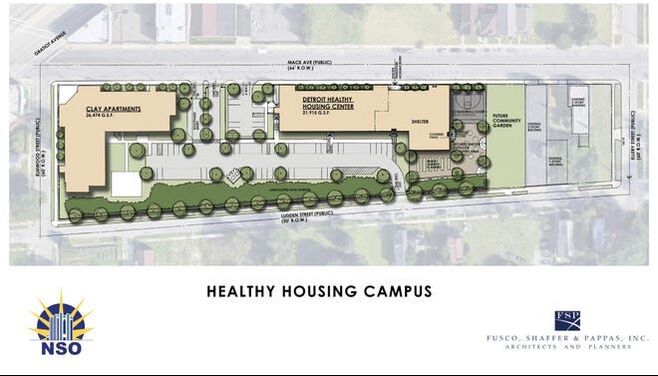|
The Neighborhood Service Organization on Wednesday unveiled a new housing development for homeless Detroiters that includes services to address economic and health challenges. A map of the Clay Apartments. The City of Detroit. The Clay Apartments, run by the Neighborhood Service Organization, is a two-story building in Detroit's McDougall-Hunt neighborhood. The campus will offer permanent housing alongside services for primary and behavioral health care, substance abuse treatment, workforce training and placement. The Clay Apartments opens Thursday and residents will begin moving in within the next few weeks. Wednesday's unveiling marks the end of the first of two phases for the $20 million campus. Fundraising is still underway for another health center and shelter. "The timing of this opening comes when more Detroiters are experiencing housing instability due to the eviction moratorium expiration, as the rate of the working poor has increased," said Linda Little, president and CEO of NSO. She said the new campus can be a "transformative solution." "If there is a silver lining to this pandemic, it is the illumination of health, social, economic inequities that are already known to those impacted and those who work closely with the affected population," she said. The building, which includes 42 one-bedroom apartments, stands at 3364 Mack Ave., near Gratiot. Thirty percent of the units are reserved for people with medical conditions who require frequent hospitalizations. Staff will be on site to provide medical and behavioral health services. There is also a fitness area, computer lab and library. The campus' second phase is slated to include an emergency shelter for 56 adults, a health clinic, spiritual services and a pharmacy for community members to use. The Clay Apartments is named in honor of Sheilah Clay, who served as president of NSO for 22 years until her retirement in 2018, in recognition of her fight against homelessness, Little said. Clay is now executive director of Community Health Corps, a health initiative for Detroiters who need help with water bills, rent and food assistance. Duggan said addressing homelessness means helping people beyond temporary shelter. "Oftentimes, folks are homeless and face significant financial hardship. They need help getting jobs, they have addiction issues, they have mental health issues. When you go back onto the street in the morning, it doesn't solve any of those things," he said. Detroit City Council President Pro Tem Mary Sheffield, who created a Homelessness Task Force in 2013, said "we can’t talk about homelessness without wraparound services." According to a 2018 report ✎ EditSign from the Homeless Action Network of Detroit, 2,231 people were identified as "chronically homeless," meaning they were homeless four times in three years or have been homeless for one continuous year and have a long-term disabling condition. Seniors made up 33% of Detroit's chronically homeless population. Overall, there were 10,744 homeless individuals — not only people who are chronically homeless — in 2018, according to the report✎ EditSign. But that number does not include the "invisible homeless population," or people forced to sleep in their cars or on a friend’s sofa, according to a news release about the project. Each year, the organization helps 4,000 people into shelters and provides housing for 500 previously homeless individuals. It has a 98% retention rate for those who are housed. Niccala Lee of Detroit is a formerly homeless client of NSO. When she arrived at an NSO shelter, she was a "shell of her former self," she said during the unveiling. "I was greeted with compassion, empathy, understanding and love. I didn't need judgment. I didn't need criticism. I didn't need to get told what I did wrong. I needed support on every level." Lee said she received physical and mental health services, transportation and housing help. Now, Lee is no longer homeless and lives in downtown Detroit. She earned her associate's degree in criminal justice while at an NSO shelter and stressed the importance of its wraparound services — case management, crisis intervention and education. “I needed someone to hold me up long enough so I could see which way to go," she said. The city of Detroit provided $1.9 million in federal HOME funds for the Clay Apartments, and the city's Housing and Revitalization Department has conditionally approved a $660,000 Community Development Block Grant for the second phase. Resource: https://www.freep.com/story/news/local/michigan/detroit/2020/09/30/detroit-housing-center-homeless-health-substance-abuse-services-shelter/3585632001/
Comments are closed.
|
AuthorWrite something about yourself. No need to be fancy, just an overview. Archives
November 2022
Categories
All
|

 RSS Feed
RSS Feed
